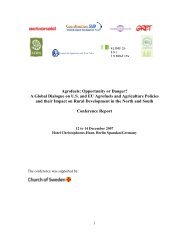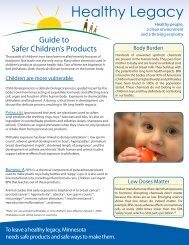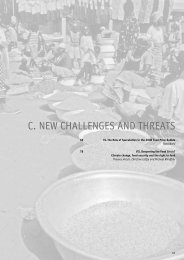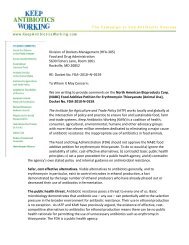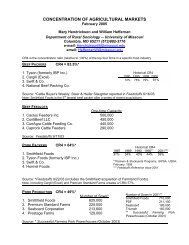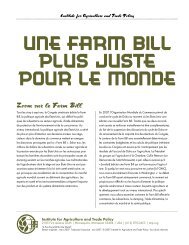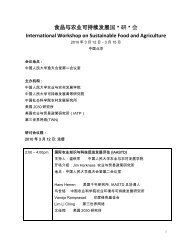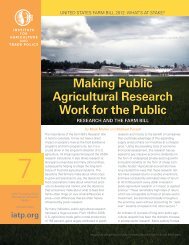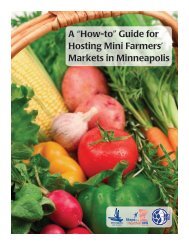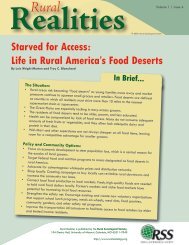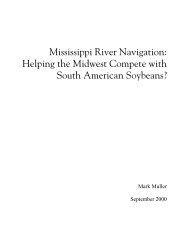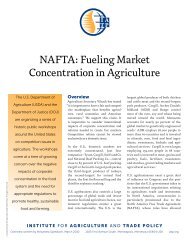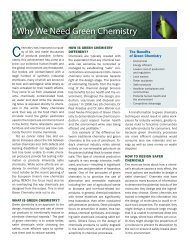IATP Hog Report - Institute for Agriculture and Trade Policy
IATP Hog Report - Institute for Agriculture and Trade Policy
IATP Hog Report - Institute for Agriculture and Trade Policy
You also want an ePaper? Increase the reach of your titles
YUMPU automatically turns print PDFs into web optimized ePapers that Google loves.
Section 2<br />
reach humans, including: 59 direct transmission via contaminated meat,<br />
transmission of the gene mediating resistance to other bacterial strains<br />
capable of infecting humans, <strong>and</strong> indirect transmission of resistant strains<br />
via the accumulation of such strains in the environment. Fecal matter<br />
having resistant bacteria in it can contaminate carcasses at the<br />
slaughterhouse <strong>and</strong> remain on meat cuts that eventually reach the<br />
consumer. Slaughterhouse workers <strong>and</strong> even farmers can harbor antibiotic<br />
resistant bacteria <strong>and</strong> transmit them to their families.<br />
http://www.iatp.org/hogreport/sec2.html (8 of 38)2/27/2006 3:50:06 AM<br />
When pathogens are resistant to antibiotics the delay caused during<br />
repeated ef<strong>for</strong>ts to find an antibiotic effective against the given pathogens<br />
can be fatal (especially <strong>for</strong> the elderly, young children, <strong>and</strong> immunecompromised<br />
individuals). Since some bacteria are resistant to more than<br />
one antibiotic, it may take even longer <strong>for</strong> medical professionals to find an<br />
antibiotic that is effective against them than if the bacteria were resistant<br />
to only one antibiotic. An untreated or poorly-treated infection increases<br />
the risk that the patient will die. Longer periods of infectiousness increase<br />
the pool of infected people that are moving in the community <strong>and</strong> that<br />
expose the general population to the risk of infection with resistant strains<br />
of bacteria. 60<br />
Antibiotic resistance increases costs of treatment in other ways. Older<br />
antibiotics can be sold in generic <strong>for</strong>ms that cost consumers less than<br />
private-label drugs. However, as older antibiotics become ineffective due<br />
to resistance, newly patented <strong>and</strong> more costly private-label antibiotics<br />
must be used. 61<br />
New or alternative drugs may be more toxic (that is, have stronger side<br />
effects) or be less effective than those that would be used if the infecting<br />
organisms had not become resistant. 62 Even alternative new drugs may be<br />
compromised, especially if they are related to drugs originally thought to<br />
have little potential <strong>for</strong> human use that were approved <strong>for</strong> use as growth<br />
promoters in animals. 63 Such is the case with the newly approved<br />
antibiotic Synercid, used <strong>for</strong> treating human disease, <strong>and</strong> also with<br />
vancomycin, an antibiotic of last resort <strong>for</strong> certain human diseases. 64 Use<br />
of virginia-mycin selected <strong>for</strong> enterococci with resistance to it <strong>and</strong> to<br />
Synercid. Use of avoparcin, a growth promoter in poultry, selected <strong>for</strong><br />
vancomycin resistant enterococci among animals; the same vancomycinresistant<br />
clone of enteroccocci has been found in animals <strong>and</strong> people. 65<br />
The market <strong>for</strong> antibiotics is influenced by the levels of resistance that<br />
exist in the microbial population. 66 Because it costs a great deal to bring a<br />
new antibiotic on the market, drug companies have a strong incentive to<br />
sell as much of it as possible, thus contributing to the resistance problem<br />
that eventually necessitates new ef<strong>for</strong>ts be undertaken to develop a<br />
substitute. Shareholders <strong>and</strong> investors in pharmaceutical companies



